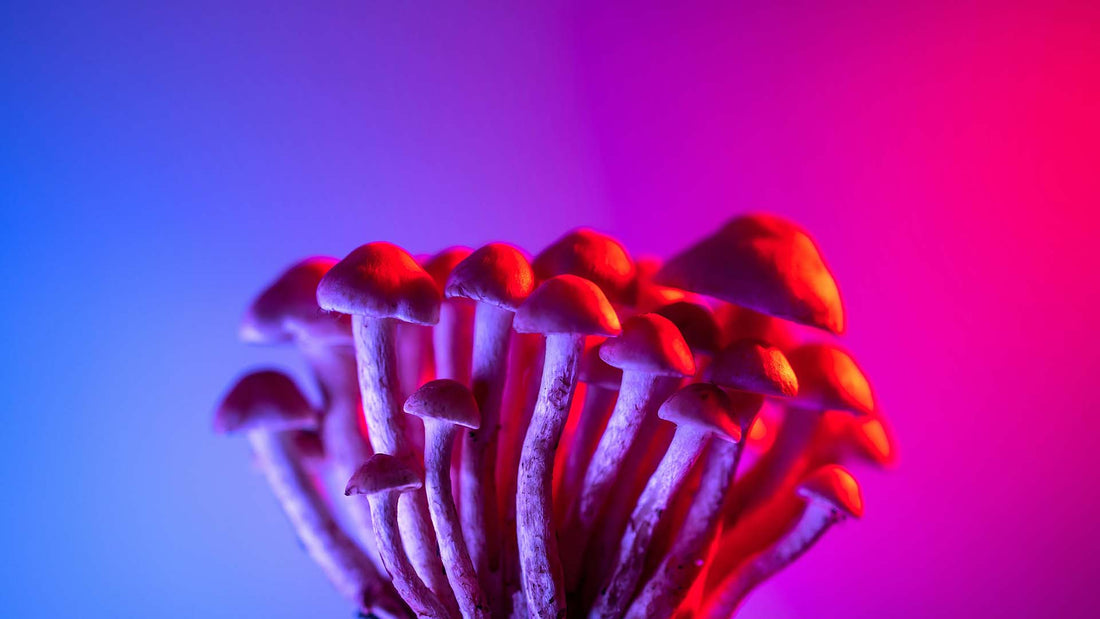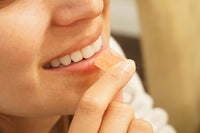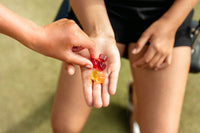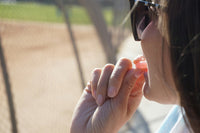
What Are Magic Mushrooms? (Effects, Safety, Side Effects, etc.)
Category / newsYou’ve likely heard about culinary mushrooms and maybe even medicinal mushrooms, but you may still wonder, “What are magic mushrooms?” Here’s the TL;DR: Magic mushrooms are fungi containing psychoactive compounds known to cause hallucinogenic effects.
These mushrooms have been used for traditional ceremonial and medicinal purposes for millennia. Many people now take them recreationally, but researchers are currently exploring their potential for treating mental health disorders like depression and addiction.
In this article, we’ll discuss what magic mushrooms are and how they make you feel. We’ll also dive into the safety and side effects of using these mushrooms and offer some alternatives for people interested in similar therapeutic benefits without the mind-altering effects.
If you’re eager to jump in and explore alternatives to magic mushrooms, check out our Goomz Gummies. Our formulas feature non-psychedelic functional mushrooms and medicinal herbs known to relieve stress and promote well-being — without the side effects or legal issues associated with magic mushrooms.
At a glance:
- What Are Magic Mushrooms?
- What Are Other Names People Use to Refer to Magic Mushrooms?
- How Do Magic Mushrooms Make You Feel?
- What Are Popular Forms and Ways to Take Magic Mushrooms?
- Are Magic Mushrooms Safe to Take?
- What Are the Potential Side Effects of Taking Magic Mushrooms?
- Are Magic Mushrooms Addictive?
- What Are Potential Alternatives to Using Magic Mushrooms?
- Explore Psilocybin Mushrooms Safely
What Are Magic Mushrooms?

Magic mushrooms comprise a group of fungi that produce psychoactive compounds, primarily psilocybin. Psilocybin is a naturally occurring psychedelic found in over 200 species of mushrooms. When these mushrooms are consumed, the body converts psilocybin into psilocin, which delivers hallucinogenic effects.
Here’s how it works: Psilocin crosses the blood-brain barrier, where it activates various serotonin receptors. This interaction increases activity in some areas of the brain, decreases activity in others, and affects how different brain regions communicate. Ultimately, these effects alter the user’s subjective experience.
Interestingly, studies suggest that psychedelics like psilocybin disrupt communication in the brain’s Default Mode Network — a region responsible for self-reflection and introspection. This disruption may explain the sense of ego dissolution people who take psilocybin mushrooms experience.
Psilocybin “magic” mushrooms look surprisingly unassuming, like many of the wild mushrooms that pop up along forest trails. While they grow naturally in many regions, magic mushrooms for personal use are more commonly cultivated than wild-harvested.
Magic mushrooms have recently become the subject of much scientific study. Early research on the therapeutic use of psilocybin mushrooms suggests they could help with several mental health conditions, including:
- Depression
- Anxiety
- Addiction
- Obsessive-compulsive disorder (OCD)
- End-of-life distress
What Are Other Names People Use to Refer to Magic Mushrooms?
Many people simply refer to psilocybin mushrooms as “mushrooms.” Like all drugs, there are also street names or slang terms. Some other names for magic mushrooms include:
- Shrooms
- Mushies
- Caps
- Boomers
You may also come across names referring to different species of mushrooms, such as:
- Liberties: Short for Liberty Caps (Psilocybe semilanceata), a common species of magic mushroom in Europe and North America.
- Blue Meanies: Refers to Panaeolus cyanescens, a potent magic mushroom species that often turns blue when bruised.
- Cubes: Slang for Psilocybe cubensis, one of the most common magic mushroom species.
How Do Magic Mushrooms Make You Feel?

Magic mushrooms affect everyone differently depending on factors such as:
- The amount taken
- Users’ age and weight
- Whether the user has eaten recently
- Personality
- Individual expectations
Most users report feelings of euphoria, a sense of well-being, altered consciousness, and changes in perception.
Many users also experience something called “ego death,” which is described as the loss of subjective self-identity or a dissolution of the boundary between self and the world. This dissolution often results in a feeling of oneness with others and the universe.
Perceptual changes are common with magic mushrooms. These might include visual and auditory hallucinations — seeing or hearing things that aren’t there — or sensory distortions. People often report spiritual or religious experiences, with hallucinations that range from subtle changes in the way trees look to profound encounters with mythical beings.
Sometimes, people have negative experiences with magic mushrooms. These reactions are commonly called “bad trips.” Bad trips can involve especially intense and unpleasant hallucinations. As you might expect, bad trips are often accompanied by anxiety, paranoia, or fear.
The Importance of Set and Setting
“Set and setting” are important factors that impact how magic mushrooms will make you feel. “Set” refers to a person’s mindset, mood, and expectations. “Setting” refers to their physical space and social environment. Being in a good state of mind and a safe and comfortable environment seems to contribute to a pleasant experience — and vice versa.
Set and setting have also been recognized as important in influencing the outcomes of psychedelic therapy, with experts arguing that psychedelic mushrooms can be clinically effective when administered under the right conditions.
What Are Popular Forms and Ways to Take Magic Mushrooms?

Magic mushrooms can be consumed fresh, dried, or powdered. Some popular ways to take these mushrooms include:
- Eating fresh or dried mushrooms raw
- Steeping mushrooms in hot water to make tea
- Cooking whole mushrooms into dishes
- Mixing powdered mushrooms into drinks or foods
- Taking powdered mushrooms in the form of capsules
Snorting mushroom powder is not recommended, and injecting magic mushrooms is downright dangerous.
Are Magic Mushrooms Safe to Take?
Magic mushrooms are generally considered low-risk compared to many other drugs. They deliver little toxicity, meaning they are unlikely to cause fatal events like breathing problems or heart attacks.
Health Risks
Taking magic mushrooms rarely results in serious incidents. A 2022 study found that only 0.2% of past-year magic mushroom users sought emergency medical treatment, most commonly for panic or paranoia. The principal risks of magic mushrooms are psychological in nature.
There are also a few physical health risks associated with psilocybin mushrooms. Taking mushrooms can make users less aware of their surroundings, which can cause people to engage in dangerous activities like driving dangerously or walking into traffic.
At the same time, psilocybin mushrooms cause an increase in blood pressure and heart rate, which can be hazardous for people with cardiovascular conditions.
Misidentification

Another risk associated with magic mushrooms occurs when people forage for mushrooms in the wild. Harvesting any wild mushroom yourself is risky, and it is not safe to consume mushrooms just because they fit a description of psilocybin mushrooms.
Psilocybin mushrooms look a lot like certain species of poisonous mushrooms that can cause severe liver damage or even death if ingested.
Illegality
The illegality of magic mushrooms in the U.S. also presents a risk for users. Penalties for possession, sale, or distribution of psilocybin mushrooms can result in serious legal consequences.
While some cities and states have decriminalized possession of small amounts, these fungi remain illegal at the federal level. Thus, there is no structure to provide any legal, safe, or regulated supply.
Mitigating Risks
Given these safety risks, experts generally recommend against experimentation with magic mushrooms. That said, people who want to mitigate their risks should consider these safety tips:
- Only consume mushrooms from a trusted source.
- Take a low, controlled dose.
- Don't combine psilocybin mushrooms with other drugs.
- Choose a calm, safe environment in which to consume.
- Have a sober “trip sitter” who can provide support.
What Are the Potential Side Effects of Taking Magic Mushrooms?

Some potential side effects of taking magic mushrooms include:
- Stomach discomfort
- Nausea
- Vomiting
- Headaches
- A fast or irregular heartbeat
- Increased body temperature
- Facial flushes and sweating
Research suggests that the risk of these side effects increases with higher doses of psilocybin. As mentioned, set and setting can influence whether you experience unwanted psychological side effects like anxiety, fear, paranoia, and panic attacks.
In rare cases, psilocybin can cause a long-term side effect called hallucinogen-induced persisting perception disorder (HPPD).
This condition is characterized by the recurrence of perceptual distortions — flashbacks of the drug experience — after the immediate effects of consumption have subsided. Unfortunately, this condition can persist for years after using a psychedelic.
Are Magic Mushrooms Addictive?
Studies show that magic mushrooms have a low potential for abuse and no potential for physical dependence. This reality may be surprising, as psilocybin is currently classified as a Schedule I drug with a high potential for drug abuse. In light of modern evidence, many experts advocate reclassifying psilocybin under a less restrictive schedule.
Still, some people may become psychologically dependent on the effects of magic mushrooms. For instance, people might become reliant on psilocybin as a source of creativity or a coping mechanism for addressing mental health issues.
What Are Potential Alternatives to Using Magic Mushrooms?
Several magic mushroom alternatives offer similar benefits with lower risks. While non-psychedelic options are not exact equivalents to the psychoactive variety, they can help support your mental health and promote feelings of relaxation and well-being. Here are some options:
Functional Mushrooms

Functional mushrooms, also called medicinal mushrooms, are non-psychedelic mushrooms traditionally used for their potential health benefits. Some common varieties include:
- Lion’s mane: Known for its cognitive benefits, including boosted memory and focus.
- Reishi: Popular for its immune-boosting properties and ability to promote relaxation.
- Cordyceps: Recognized for enhancing energy and athletic performance.
- Chaga: Supports immune function and combats inflammation.
- Turkey tail: Valued for promoting overall wellness.
If you’re interested in exploring these functional mushrooms, our Goomz gummies are a great place to start. We offer a range of chewable supplements packed with high-potency mushroom extracts and traditional plant medicines like Kanna, Kava, and Blue lotus. While our gummies contain no psychedelics, they offer various benefits that rival those of magic mushrooms.
Our formulas are carefully crafted to support various health goals, from promoting focus to lifting your mood and helping with sleep. Need another reason to consider our gummies over psilocybin mushrooms? They’re much tastier than eating raw mushrooms or choking down bitter mushroom tea.
Call us biased, but we know that Goomz Gummies are some of the best mushroom gummies for those seeking a legal alternative to magic mushrooms — one that won’t produce hallucinations or altered consciousness. Take a look at our products to learn more.
Herbal Supplements
Herbal supplements offer various therapeutic benefits. Certain herbs promote relaxation, boost mood, or enhance cognitive function. For example, St. John’s Wort is often used to manage depression and anxiety. Similarly, Ashwagandha and Rhodiola rosea are known to balance the effects of stress and promote feelings of well-being.
CBD
CBD is a non-psychoactive compound derived from cannabis. It delivers several mental and physical health benefits. Many people use CBD for its relaxing and mood-enhancing properties. The best part? CBD derived from hemp is legal in many places where magic mushrooms are not, making it more accessible and safer to consume.
Amantia Gummies

If you search for magic mushroom products online, you’ll likely encounter several Amanita muscaria gummies. Amanita muscaria, also known as fly agaric mushrooms, produce psychoactive effects like mild euphoria and altered perception. Unlike psilocybin, Amanita mushrooms are legal in most of the U.S., so they’re more accessible than magic mushrooms.
Amanita gummies are typically marketed as legal psychedelics. If you want to learn more, you can read about some of the best psychedelic mushroom gummies here. Just be warned that there has been limited research on the safety and therapeutic potential of Amanita muscaria.
Breathwork Techniques
Specific breathwork techniques, such as holotropic breathwork, can induce states of altered consciousness similar to those derived from magic mushrooms. Research suggests that breathwork may reduce stress and address other mental health issues. Trying it out is easy, completely legal, and safe when done under proper guidance.
Explore Psilocybin Mushrooms Safely

While magic mushrooms are relatively safe compared to many other psychedelics, they are not without their risks. Continued research on psilocybin mushrooms will expand our understanding of their benefits and essential safety considerations. Until then, it may be best to stick with non-psychoactive alternatives like functional mushrooms.
Our Goomz Gummies make trying functional mushrooms easy and delicious. We offer a variety of mushroom gummy formulas to target sleep, mood, cognitive performance, and more. Whether you’re seeking to elevate your spirits or achieve a focused flow state for creative work, check out our collection of gummies today!


